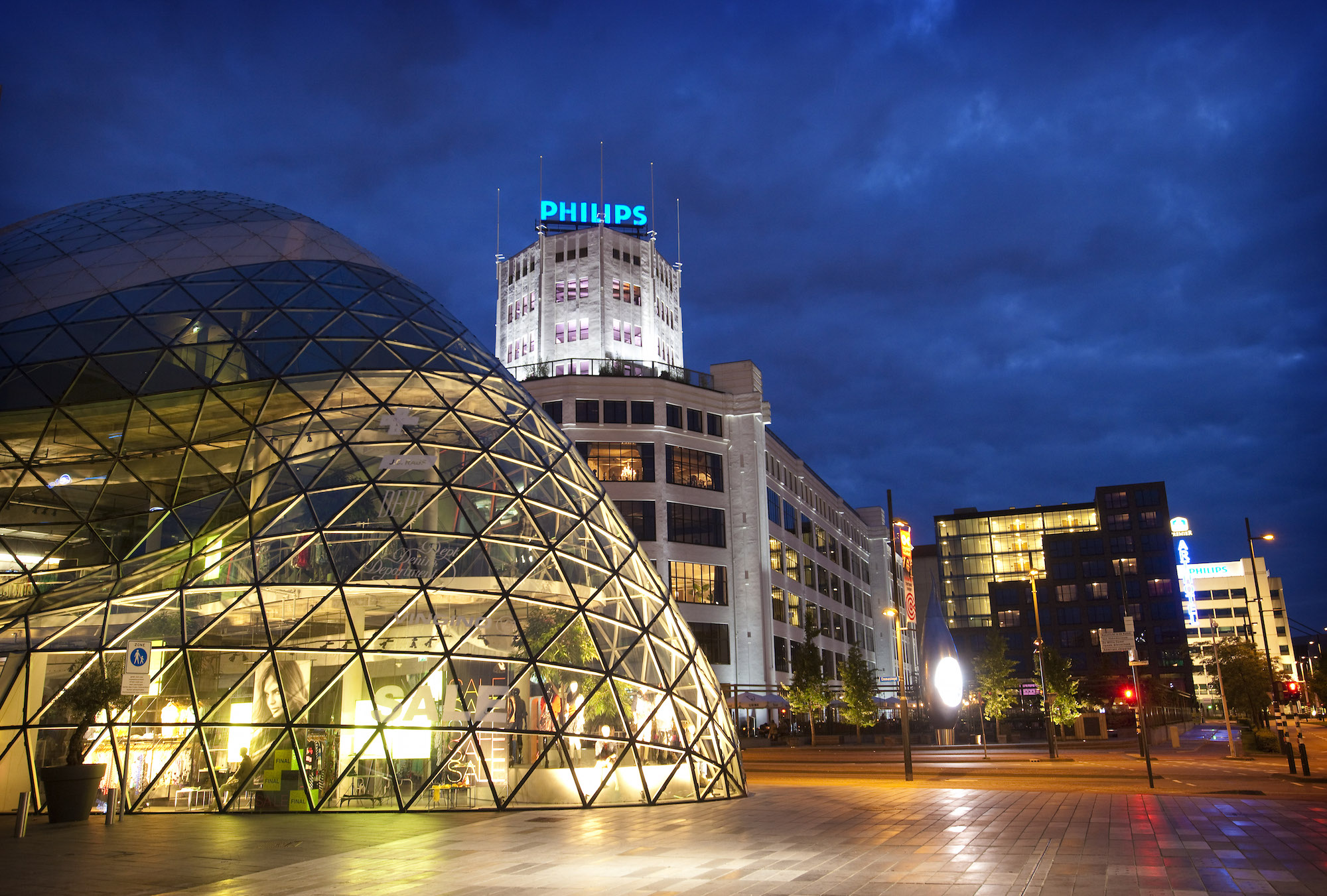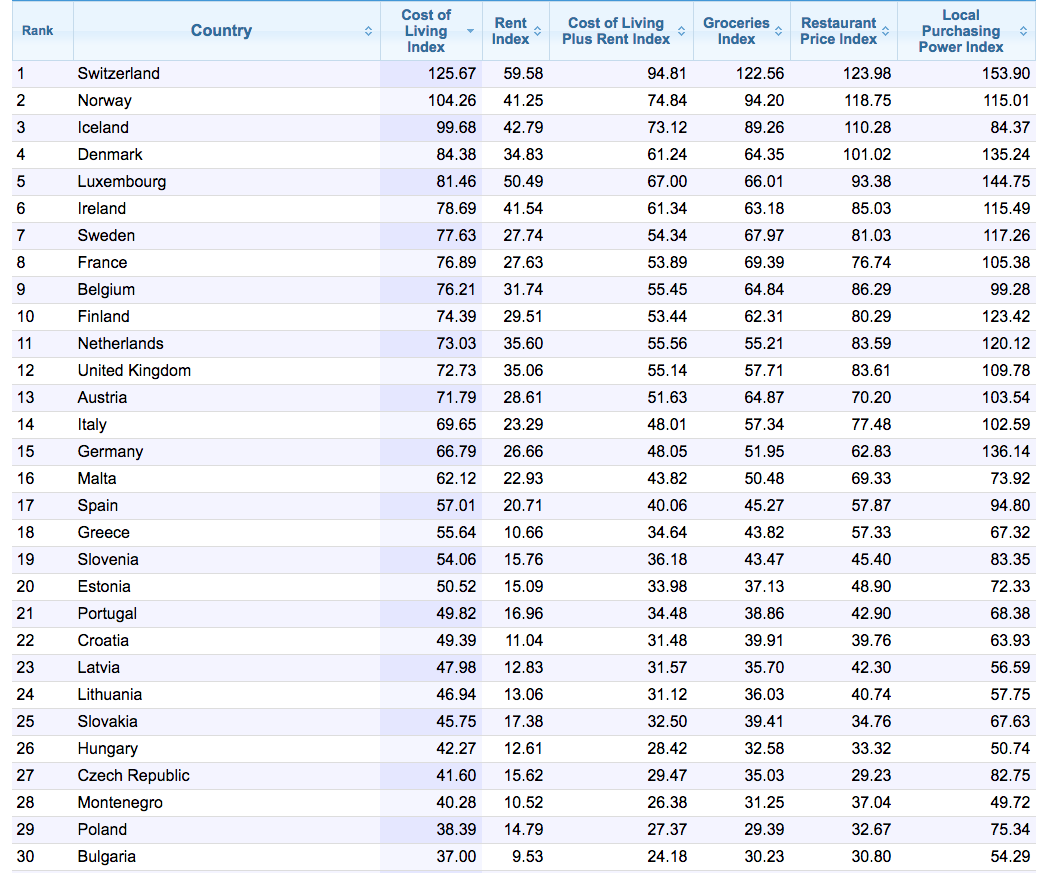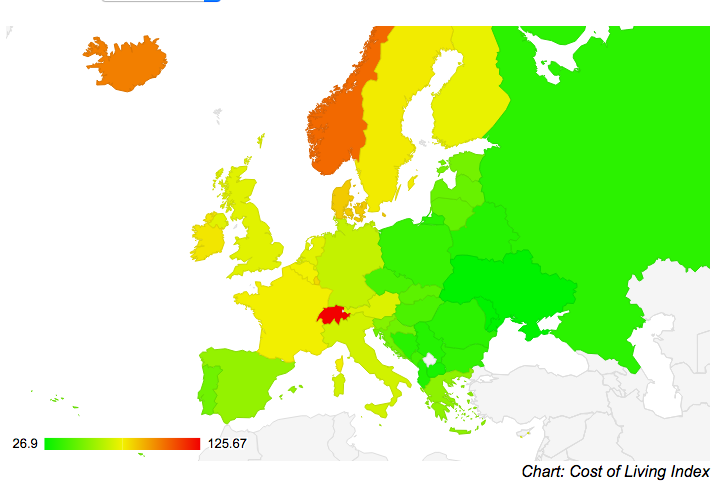When we started researching this “Best Cities for Expats” list back in September, it was a different world.
Donald J. Trump wasn’t the president-elect of the United States of America, and there was no real impetus to find just the right city for our friends we left behind in the States. Though Brexit was a reality, entrepreneurial Brits and EU citizens in the UK weren’t yet searching for a more tempting city for international talent.
Now, a significant number of people in the U.S. and the UK are asking themselves, “So, do I tough it out? Or do I find a place to make my stand and take it easy?” (Thank you, Jackson Brown.)
We can’t say we saw all this coming. But we have – coincidentally – been researching for years the perfect place to start Dispatches Europe, because we believe the global mobility of talent is the defining social phenomenon of the 21st Century.
For this list, our value proposition is, “If you are offered a position that pays really well, you can have an amazing, glamorous life in cities which aren’t considered the ‘it’ places in Europe. Same for joining a startup or even starting your own business.”
But the list of great cities for expats of limited means turned out to be much shorter than you might imagine.
We know. We went through the process of making our own list, ranking cities based on practical matters most crucial to a successful transition for expats – affordability, concentration of talent, pervasiveness of English and easy access to the whole of Europe.
Some of our initial candidates turned out to be wildly impractical – Basel and Luxembourg City – due to the cost of living. We crossed others off the list, such as Izmir, Turkey, because of political instability or burdensome regulatory requirements.
In the talent wars, European leaders have gone through their own journey of trying to identify Europe’s Silicon Valley, with all signs pointing to Stockholm.
Stockholm is welcoming to highly skilled expats, beautiful and nearly perfect except for one thing: There’s no place to live.
Last month, Politico.eu posted “Homeless on Stockholm’s silicon slopes,” about a techie from the U.S. who falls in love with Stockholm and quits his job, only to end up in Housing Hell. “You have to wait in line for years to even have a chance of an apartment,” the 34-year-old game developer said. It was a major departure from his experience … in Los Angeles! Not exactly one of America’s depressed housing markets.
Does Stockholm sound like it’s going to be Europe’s Silicon Valley? Ah, no. London? The average house price is 530,000 pounds. Uh-unh. Riga, Latvia? A very cool tech center and affordable. But they can see Putin rear his head from there, as Sarah Palin put it so eloquently. Budapest has been hot for awhile, but it disqualifies itself because it’s in a country with proudly reactionary, antisemitic leadership.
For a little perspective, remember that Silicon Valley became the center of the tech world because it started out as cheap farmland outside San Francisco where Hewlett Packard and other companies built offices, labs and factories.
Also, a lot of what we think of when we think of The Valley actually happened other places. Marc Andreesson didn’t come up with the first Internet browser, Netscape, in Palo Alto. He did all the coding at the University of Illinois in Urbana-Champaign. Facebook was born at a Harvard dorm in Boston.
The truth is, you don’t have to live in Silicon Valley to be happy and successful … or Berlin or Amsterdam, for that matter.
So, let’s look at Europe. Yeah, Berlin is a sexy 24-hour party and gets crazy pub. But you missed the boat. Rents are up dramatically just since we were there in the summer of 2015.
Other places are just too isolated. The Ringerike region of Norway just north of Oslo is offering Americans shelter from the storm. But Norway strikes us as a bit isolated and way too expensive for most entrepreneurial expats.
Finally, there are lot of incredible cities in countries that are, shall we say, unwelcoming. That includes France, where an onerous bureaucracy makes getting a long-term residence visa and starting a business too difficult.
So, where does that leave the aspiring expat? With some terrific options if you have reasonable expectations.
Is there one city offering everything English speaking expats from around the world – India, China, the USA – need?
This was the easiest pick we’ve ever made.
No. 1 Eindhoven, Netherlands
Eindhoven wins by a mile. It’s probably the only city in Europe that has it all; a central location in Europe, quality of life, talent, affordable housing and the main business language is English.
Admit it … you’ve never even heard of Eindhoven. Let’s start with this: Modern Eindhoven looks like the future … not just repurposed industrial buildings, but entire repurposed districts such as Strijp-S, a surprising number of skyscrapers for a city of 225,000 residents and – if you look hard enough – a few traces of the 12th century trading post it once was. There’s a High Tech Campus with the biggest names in digital including Microsoft and Oracle, as well as the HighTechXL hardware accelerator.
Shimano, the Japanese company renowned for advanced bicycle technology, just opened its European headquarters there.
Okay, a few caveats … Eindhoven isn’t Amsterdam. There are no canals, and very few quaint streets. But not being Amsterdam also means Eindhoven is neither crazy-expensive nor swarming with tourists. Eindhoven’s center city is chock full of great shops and restaurants and is always buzzing.
A dozen other terrific cities are no more than two hours away from Eindhoven by train or car including Amsterdam, Utrecht, Maastricht, Den Haag, Dusseldorf and Brussels.
We could go on for days about Eindhoven’s comparative advantages including a hot job market for engineers and other highly skilled workers. Which is nice. But what makes Eindhoven stand out is, it’s a figure-it-out town where Expat Spouses Initiative is solving one of the biggest challenges for multinationals …. getting trailing spouses out of the house and back in the workforce.
Eindhoven also has affordable rents starting at maybe 800 euros per month for a decent 2-bedroom apartment and some mega event or another literally every weekend ranging from music festivals to GLOW to Dutch Design Week. There is International School Eindhoven, an affordable international school for elementary and high school kids, Technical University Eindhoven, which has a lot of international students, and Tilburg University 30 minutes away offers a majority of classes in English.
Eindhoven is no one’s esthetic dream, but that’s just as true of Mountain View, Cupertino and the rest of Silicon Valley. No one goes there for the view.
They go for opportunity, and Eindhoven has that in spades.
We’re not the only ones who think so. Eindhoven was runner-up to Copenhagen for 2017 European City of the Year from the Academy of Urbanism. Montpellier, in the South of France rounded out the Top-3. ECOTY recognizes “the best, most enduring or most improved cities,” chosen by a group of top architects, city planners and developers based on all sorts of social and commercial factors.
There you go.
This town isn’t for everyone … but if you’re talented and ambitious, this is a great place to make your mark.
- Cost of a three-room apartment in the city center: 1,243.75 euros per month
- Average monthly salary after taxes: 2,181.24 euros
- Domestic beer: .81 euros (Editor’s note: This is actually true … we buy local beers such as Brand and Bavaria for way less than 1 euro at the supermarket.)
- Meal for two people at a nice restaurant: 55 euros
• No. 2 Frankfurt, Germany
You smell that? What is that? What’s that smell? It’s … money. We smell money.
Okay, we’re going to stick out our necks out a bit on this one, but this is our crystal-ball call. We see Frankfurt as having all the ingredients in place to replace London as Europe’s financial center.
The main ingredient is jobs: More than a dozen multinationals including the world’s largest banks are headquartered in Frankfurt or have operations there, with more to come.
Many of Europe’s largest banks and financial institutions are considering leaving London not for Berlin, but for Frankfurt. UBS just picked Frankfurt for its new wealth management operations. Why? Because Frankfurt is both semi-affordable and stocked with top management talent.
For the state of Hessen, which includes Frankfurt and Wiesbaden, the employment rate is under 5 percent … among the lowest in Europe.
Berlin was hot for so long that we forgot about Frankfurt. But in Berlin, rents are climbing and gentrification has reached even the most bohemian neighborhoods including Friedrichshain and Neukölln. Since 2011, Berlin’s population has grown by about 200,000 people to about 3.5 million population. As we found out on our reconnaissance visit in August 2015 as we were starting Dispatches, buying an apartment in trendy areas such as Kreuzberg (where expats want to live) costs more than 4,000 euros per square meter, almost double five years ago, according to a recent Bloomberg post. Million-euro properties are now a thing.
From that post:
Berlin’s a start-up hub but plenty of other European cities are trying to lure young techies. If rents and prices go much higher, it will lose its chief attraction to the hipster crowd: low living costs and lots of cheap space. That might be a brake on the mania.
Berlin is still inexpensive in world terms, but no longer the “poor but sexy” Mecca for creative types. Munich is incredible, but it’s the Zurich of Germany … for millionaires, only. We think Frankfurt is the overlooked city in Germany with a reasonable cost of living in suburbs such Darmstadt and with great career opportunities. To some extent, it’s a numbers game.
In Berlin, a 3-bedroom apartment in the city center runs more than 1,600 euros per month, according to Numbeo, though we never saw anything under 2,000 euros during our search.
By comparison, a comparable apartment in the Frankfurt suburb of Darmstadt will run you about 1,178 euros per month. Not hugely cheaper. But Frankfurt has one really big advantage … its airport. Yes, we hate it. But you can fly anywhere in the world from Frankfurt International Airport. There are at least three international schools and other amenities for families.
Frankfurt has one major drawback in that it’s always seemed, well, dull by comparison to Berlin. So, we ran this past our own expat expert Ivana Avramovic, and to our surprise, she agrees with our take. Why? Because Frankfurt is more open.
“I would live there in a heartbeat,” Ivana said. “It feels very international. You feel at home there. You don’t feel like an outsider.”
Which is a huge thing when you’re new in town.
- Cost of a three-room apartment in the city center: 1,178 per month
- Average monthly salary after taxes: 2,420 euros
- Domestic beer: 3.50 euros
- Meal for two people at a nice restaurant: 47.50 euros
No. 3 Vienna, Austria
 As we’ve posted before, when we were looking for a place to land in Europe, Ivana insisted Vienna was the place. Exciting and beautiful, with more events, concerts and cultural offerings such as museums, art, opera and theater than anyone can possibly attend.
As we’ve posted before, when we were looking for a place to land in Europe, Ivana insisted Vienna was the place. Exciting and beautiful, with more events, concerts and cultural offerings such as museums, art, opera and theater than anyone can possibly attend.
It has an incredible expat community with multiple public Facebook pages with job listings, apartments and invitations just to grab a coffee. Also, most people speak English.
Every quality of life list in the world has Vienna at the top, or highly ranked.
But we saw a few problems including a (slightly) higher cost of living than Eindhoven and a location that’s closer to Poland than Paris. Which is an issue for us.
Turns out we might have been wrong. All of a sudden, Vienna is hot. There’s an entirely new city outside the city center to help solve Vienna’s tight housing market. Vienna has an emerging startup eco-system. The tech press is starting to notice.
From a Tech Crunch post last summer:
Austria, this country of old charms, is beginning to position itself as one of the most attractive bases in the world to launch a new company. And in light of recent successes, including the biggest exit in Austrian startup history — Adidas’s $240 million acquisition of the fitness app Runtastic — there’s reason to believe the startup scene could take on a big role in Europe’s future.
Vienna also just snagged the No. 10 ranking on the new European Digital City Index, which uses hard data to rank how European cities support digital entrepreneurship.
We saw some early signs that Vienna was joining the Digital Age during our visit last April. What’s indisputable is that Vienna is exciting as you can see from Ivana’s weekly Vienna events posts on Thursdays. The Global Entrepreneurship Monitor ranks Austria as a whole as the strongest country in Europe for public pre-seed investment.
Life-long expat Ivana has lived there for three years, and she knows the city inside and out. She recommends the great infrastructure, public transportation and the airport “that feels like a bus station because there are almost no waiting lines, but there are great connections to lots of European and international destinations.” Bratislava and Budapest are very close.
When you look at all the elements, Vienna stands out just on quality of life. “Urban and nature, they intertwine so seamlessly in Vienna, so you get all of it,” Ivana says. Then you add to that how Austria just sent a powerful message about its allegiance to the EU.
Vienna is a winning choice for the right expats.
- Cost of a three-room apartment in the city center: 1,584.20 per month
- Average monthly salary after taxes: 1,840.79 euros
- Domestic beer: 3.50 euros
- Meal for two people at a nice restaurant: 50 euros
4. Lisbon, Portugal
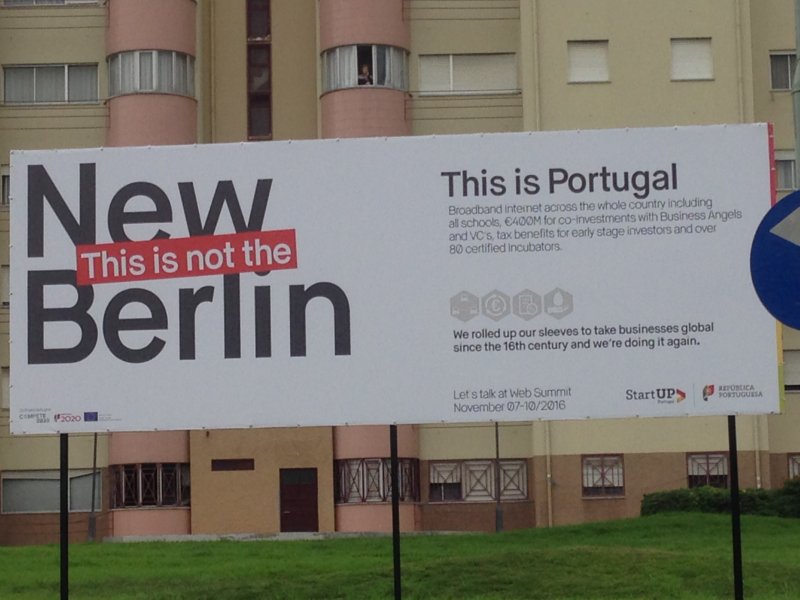 We were tempted to put a lot of undiscovered cities in the No. 4 slot including Sofia, Bulgaria and Cluj, Romania. But one of the lessons we’ve learned in life is that it’s far more fun and profitable to be at the beginning of something than at the end.
We were tempted to put a lot of undiscovered cities in the No. 4 slot including Sofia, Bulgaria and Cluj, Romania. But one of the lessons we’ve learned in life is that it’s far more fun and profitable to be at the beginning of something than at the end.
Starting in 2011, Portugal got a post-Great Recession do-over in the form of an $85 billion bailout from the EU. According to European Commission projections, it’ll be maybe another 10 years before Portugal gets back to post-2007 employment levels!
In the meantime, everything seems to be going their way.
Lisbon is just now getting insane attention and praise for all the right things including an increasingly sophisticated foodie scene and a surprising rivalry with Dublin for tech startups. Lisbon just stole away Web Summit from Dublin.
“We chose Lisbon because of the strong infrastructure in the city, the world-class venue and the thriving startup community,” Web Summit Founder Paddy Cosgrave said when he announced the move.
“In 2015, Lisbon became the first city to receive the European Entrepreneurial Region award. Investors from across Europe have started looking to Lisbon to capitalize on the low rents and affordable IT talent. Dozens of Portuguese startups have exhibited at Web Summit and Codacy won Web Summit’s PITCH competition last year.”
Last year, the European Commission announced the startup scene in Portugal is “a force to be reckoned with.” Since 2010, Portugal had 40 startups that raised more than $1 million from VCs. Each. Not bad. Not huge, but not bad. Even the World Economic Forum is singling Lisbon out for becoming an innovation center.
Any place with sun and sea is going to be enticing. But Portugal is still a relatively poor country compared to the mega-economies such as Germany, Norway, Sweden and the Netherlands, ranked by raw GDP or by per-capita income.
Which is an opportunity begging to be seized.
- Cost of a three-room apartment in the city center: 1,584.20 per month
- Average monthly salary after taxes: 863.18 per month
- Domestic beer: 1.50 euros
- Meal for two people at a nice restaurant: 30 euros
5. Copenhagen, Denmark
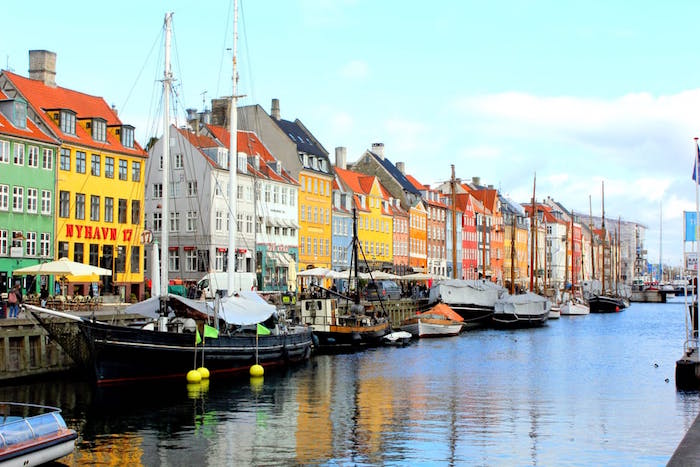 It’s hard to argue with success.
It’s hard to argue with success.
As we wrote above, Copenhagen just beat out Eindhoven and Montpellier to win the 2017 European City of the Year award. The Academy of Urbanism picked the Danish capital because of its vision to improve citizens lives, and to engineer in pedestrian and cyclist safety over cars.
“Copenhagen is a capital city that has set the standard for intelligent, inclusive and sustainable urban management over the last 40 years,” said Steven Bee, AoU chairman.
What’s harder to argue with is Ivana’s contention that Copenhagen very much deserves to be on the list despite its high cost of living. “It’s expensive, but worth it,” Ivana says.
Copenhagen makes the headlines every day with some new innovation or trend. Lately, the media have discovered bikes now outnumber cars in the center of the city. Copenhagen is also increasingly sophisticated, leaving behind its hedonism for more sustainable culture. Finally, Copenhagen is, unlike Stockholm, addressing its growing housing shortage by retrofitting its docks into a new Green, affordable community called Nordhaven.
The goal is to – over the next 50 years – convert a large section of Copenhagen’s port into a collection of inviting urban neighborhoods, with as many as 40,000 residents. The Nordhaven vision is a community built on a “five-minute principle,” where it will take no more than five minutes for residents to reach schools, daycare facilities, groceries and the metro.
It would be No. 1 on our list but for one little thing: It’s freakin’ expensive.
- Cost of a three-room apartment in the city center: 2,185 euros per month (converted kroners to euros)
- Average monthly salary after taxes: 2,629.71 euros per month
- Domestic beer: 6 euros
- Meal for two people at a nice restaurant: 80 euros
Other notable destinations to consider:
• From our friend Alice Verbene, who lives in France and is a lifelong expat:
Not to be missed as an artists’ place to settle down (especially performing/improv/satire/
Just about anywhere in rural France is dirt cheap and the quality of life is wonderful (if you are willing to learn the language and make an effort to involve yourself in the local community).
France is a great value if you move to the countryside and choose an area that is not overdeveloped. There are some amazing deals to be found on the internet if you can read French and surf their sites.
A cottage that recently sold in my town for 40,00o euros with two garages and a stone walled garden. There are also mansions, castles and farms that go up for sale by various mayor’s offices for dirt cheap. Basically, you submit a dossier with a proposal and amount you are willing to pay for the property (in French), the mayor’s office reviews and grants the property to the best offer.
For instance, there are three buildings available in my town via the mayor’s office at the moment (a small abandoned house that needs to be gutted and redone, a farm complex that would be ideal for horses or cattle and a historic mansion that would be ideal for a university to take on as a study abroad location). All buildings need initial investment and renovation, but they all have potential if the right person purchases them. The mayor’s office has refused a few proposals already since they did not like the dossier based not on the money as much as what the person wanted to do with the building. They want the right fit for the area to grow the economy.
• Varna, Bulgaria
From Distpaches contributor Kalina Varbanova:
I want to promote my city Varna as a good place for living. Varna is a city on the Bulgarian Black Sea coast. We have history from prehistoric and antiquity. Many culture festivals are held in Varna. The city is tourist-friendly. Combine summer tourism with culture.
(Expats) are welcome in Varna. The cost of living is not expensive. We have good public transportation system – buses, trolleys, taxis. Rents are not expensive. There are career oppotunities in any sphere. Young people speak English, so English-speaking tourists and expats will feel at home.
• Skopje, Macedonia:
Skopje has a mild southern climate. And as one person we interviewed put it, “You don’t have the police on your ass because you didn’t separate the trash properly. Amazing life if you’re paid well.”
Co-CEO of Dispatches Europe. A former military reporter, I'm a serial expat who has lived in France, Turkey, Germany and the Netherlands.


